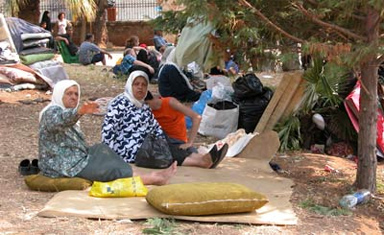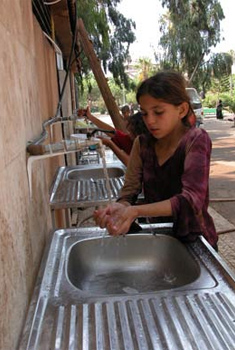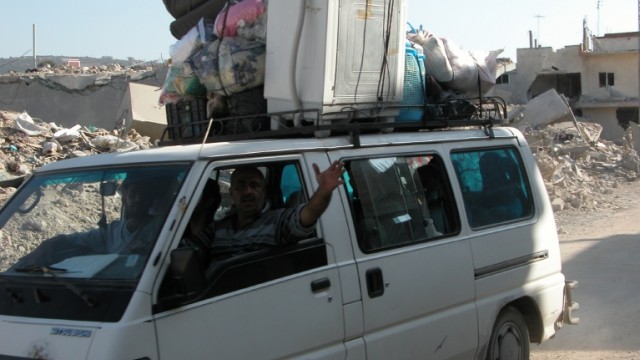A wave of solidarity has swept the country: a Palestinian refugee camp is hosting Lebanese families.

Photo : EC/ECHO/Daniela Cavini
BEIRUT. They keep coming; first it was hundreds, then thousands; now tens of thousands. They left their homes with nothing. Some don’t even have a roof over their heads and are sleeping in a public park. Above them, planes come and go with their deadly cargoes.
Nobody really knows how many people have been displaced – it could be 600,000, perhaps more. They come mainly from the south, from Tyre, Nabathie, Tebnine and El Khiam. They come packed in cars and vans, waving white flags through the windows. Some have left homes already reduced to rubble while others simply locked their doors and headed north, hoping there will be something to go back to.
As a result, the main conflict zone is almost empty. Humanitarian organisations say that only two people in ten are still in the region south of the Litani river. They are the neediest ones, the old, the sick, those without a car, the ones who ‘want to die where they were born’, as people say. They are now isolated in pockets, very hard to access because the fighting is heavy.
The others, the great majority, have fled north. Some can afford to rent rooms, at very high prices. Many have found shelter with family or friends: the Lebanese social networks are under strain, but still coping. A wave of solidarity has swept the country. Families everywhere have opened their doors, shared their homes. In Beirut, we found nine people in one room. In an ironic twist, the Palestinian refugee centres located in the South – spared so far by the shelling – have opened their gates to host fleeing Lebanese. But resources are limited and some are beginning to wonder how long the bread can be shared.
In the meantime, the international aid machine has started running. The first coordination meeting of relief organisations, chaired by the European Commission’s Humanitarian Aid Department (ECHO), was held at the Commission Delegation in Beirut on July 20. This was rapidly followed by a hectic series of discussions, needs assessments and the drafting of concrete proposals. €20 million of EU taxpayers money has been committed and the first wave of projects is now ready for implementation. Of course, many organisations are not waiting for the contractual procedures to be finalised, and are already distributing blankets, mattresses, food and water. Things are made easier for them because humanitarian aid funds managed by ECHO can be backdated to the time the crisis began.
Throughout the country, about 100,000 displaced people have ended up in public buildings. In Beirut alone, 103 schools are hosting uprooted Lebanese, and many more are still on the move. A lot of people are wandering from one shelter to the next, looking for better accommodation.

Photo : EC/ECHO/Daniela Cavini
Local NGOs, together with European partners, are working round the clock to help the victims. Priorities have been established and, thanks to ECHO’s coordination, organisations have chosen different operational zones and are trying to harmonise their interventions: for example on what should be included in the emergency kits and how much should be paid for different items.
The Spanish NGO, MPDL, which has been working in Saida for some years, is delivering assistance to around 5,000 people accommodated in schools, colleges and municipal buildings. They buy the goods locally – everything from soap and washing powder to beans, tuna and cheese. “For the moment we can find everything in town,” explains the MPDL coordinator, Jean-Christophe Saint Stebe, “but prices are increasing. We are trying not to disrupt local markets.” From their warehouse in Saida, MPDL staff prepare and deliver food and hygiene kits daily trying to reach the most vulnerable and isolated families, with their small fleet of two vans and three cars. “Our local partner, Nabaa’, is our strength,” says Jean-Christophe. “Thanks to their network we were able quickly to assess needs and prepare our emergency intervention accordingly.”
Since the beginning of the conflict, the French NGO, Première Urgence (PU) has focused on the coastal city of Tyre. “We thought there might be high needs there”, says PU’s Alexandre Giraud. “Unfortunately we were right. We have sent in an emergency team, and are currently delivering supplies from Beirut. It’s difficult and dangerous to send convoys to that area; Tyre is effectively a war zone. But we have to act. We provide canned food because people have no gas or electricity, and they cannot cook.”
Of course, Beirut itself has also been bombed. About 50,000 people have been uprooted from the Al Dahie district, and the Danish Refugee Council (DRC) is already delivering aid to schools where the displaced have found shelter. DRC works in partnership with the Amel association. The aid consignments are prepared in the morning and delivered before the evening, when the likelihood of air strikes increases. “Of course there is a higher risk working in certain parts of the city,” says Ibrahim Abou Khalil,” but we try not to think about it. People need the help.”
In Sanayeh National Park in central Beirut, some 300 people, mainly from Tyre, are sleeping on the grass under the trees. In the last 12 days, about 3,400 uprooted people have stayed in the park before being evacuated to safer locations. A network of university students is taking care of them. “We started to work on the first day of the conflict,” says Serjoun Kantar. “We are all volunteers. We just couldn’t stand by and watch all this happening without doing something about it. We run this place through donations. The municipality has set up some water facilities, but people can’t have a shower, and the needs are still great.”
Not far from the park, a French film is showing at the Cinema Medina. Entrance is free and members of the public rub shoulders with 85 displaced people from villages around Nabatiye, for whom the cinema is a temporary home. The owner, a famous Lebanese actress, opened the doors to the needy, and the daily film is offered to give people a respite: to help them take their minds off the tragedy unfolding around them.
Daniela Cavini
ECHO Regional Information Officer – Amman

